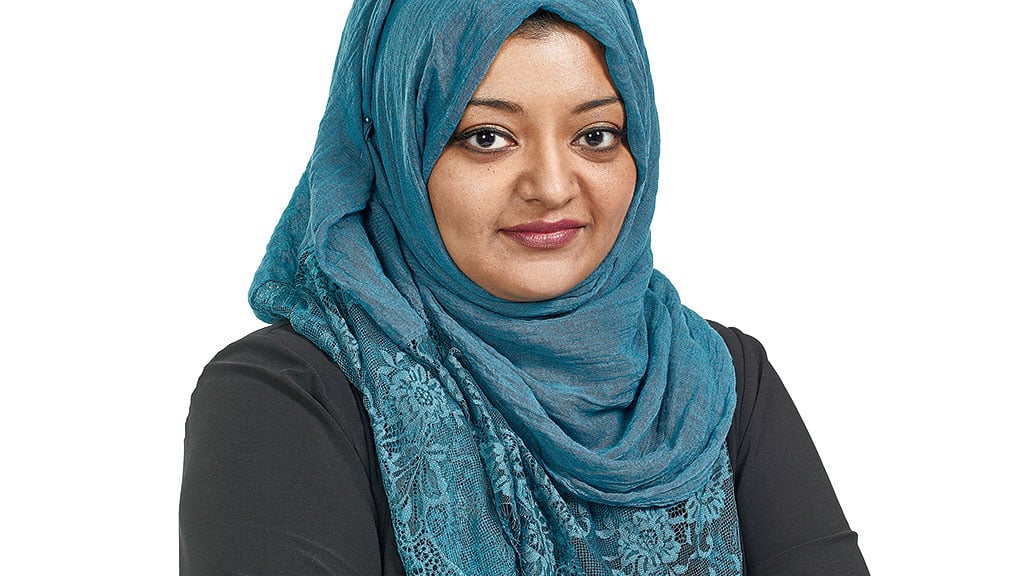This week, a Baltimore City circuit court judge vacated the conviction of Adnan Syed—the subject of the 2014 hit podcast Serial—who had been convicted in the 1999 murder of his ex-girlfriend and high school classmate Hae Min Lee, and has maintained his innocence ever since. After serving 23 years of a life sentence, Syed was released from Jessup’s Patuxent Institution on Monday and placed in home detention.
Serial, one of the first true-crime deep-dives in podcast form, turned Syed’s case from a local story into a widespread, did-he-or-didn’t-he obsession. And it wouldn’t have happened if not for Rabia Chaudry, a lawyer who works at DC’s US Institute of Peace. Chaudry—one of Syed’s longtime friends—has advocated on his behalf for decades and first brought his story to the attention of Serial host Sarah Koenig.
Chaudry has long had issues with the way Koenig’s podcast told Syed’s story. Now that Syed has been released—Maryland prosecutors have 30 days to say whether he’ll be re-tried or the case will be dropped—interest in the saga has kicked back up. And so has the Chaudry vs. Serial conflict, especially on Twitter.
Here’s the backstory:
Chaudry first criticized Serial to Sarah Koenig herself.
Chaudry began documenting her response to the podcast on her blog in 2014. When Chaudry brought the case to Koenig, she’d hoped the journalist would strongly advocate for Syed. Chaudry was further frustrated by her inability to have a say in what went into the episodes. After Koenig did not definitively assert Syed’s innocence at the conclusion of Serial, she and Chaudry reportedly had several “heated exchanges.”
In 2015, Chaudry launched her own podcast—and her own investigation.
The first season of Chaudry’s Undisclosed podcast further explores Syed’s case (the following seasons delve into other potentially wrongful convictions). In 2016, Chaudry told Washingtonian: “Serial was the most important thing that could ever have happened to this case.” But she goes onto ask, “if it was so much of a story for the Serial team, then why have they not wanted to keep following the case afterwards?”
In Chaudry’s podcast, she and two other attorneys call attention to the inconsistencies in key witness Jay Wild’s story, as well as other details that had not been included in Serial. Chaudry has used donations to the show to pay Syed’s legal fees.
In 2016, Chaudry released Adnan’s Story, a book about the case.
The front cover reads “The search for truth and justice after Serial.” In the introduction, Chaudry writes, “this book will tell the stories Serial didn’t and address issues of justice, bigotry, faith, devastation, healing, and hope from the point of view of Adnan and those who support him.” She told Washingtonian: “There were little points of frustration with Serial where we felt it left out important things.”
In 2018, Chaudry tweeted a thread of pages from the book, including Syed’s letters to Koenig and “the oddities that Serial never discussed.”
These include flaws in the police’s handling of the case and her assertion that Lee’s autopsy conflicted with the state’s timeline, among other inconsistencies.
Chaudry served as producer on the 2019 HBO documentary series The Case Against Adnan Syed.
The documentary series sides with Syed, in contrast to Serial‘s neutral approach. HBO Documentary Films will release a follow-up episode detailing Adnan’s release in 2023.
On September 16, 2022, a few days before Syed’s release, Chaudry slammed Serial again.
Chaudry tweeted: “Serial set fire to Adnan’s story, to some extent deliberately, and has never apologized or made amends. Should I be grateful? I find it hard to be. But I am grateful to the thousands that responded to the fire to help rebuild this house.”
The day after Syed’s release, Serial put out a short follow-up episode. Spoiler alert: Chaudry wasn’t into it.
Koenig explained the updates to the case and said, “Even on a day when the government publicly recognizes its own mistakes, it’s hard to feel cheered about a triumph of fairness because we’ve built a system that takes more than 20 years to self-correct, and that’s just this one case.” Chaudry wasn’t having it. She tweeted in response, “Again, a wishy-washy dismissal of the thousands of hours of work we put in to get the Juvenile Restoration Act passed in Maryland, reinvestigate the case and find new evidence, and fight for every document from the state.”
On September 21, Asia McClain Chapman, who served as an alibi witness for Syed and was prominently featured in Serial, had more criticism for the podcast.
McClain Chapman tweeted, “I’m just gonna say it. I hate Serial and I feel like it lacked a real genuine concern for the people involved. I feel Sarah don’t give a damn about any of us. Adnan included.”
Ira Glass, host of This American Life, the show that developed Serial, came to Koenig’s defense:
He tweeted “Sarah’s coverage is still better than anyone else’s. New episode of @serial is here.” Chaudry replied: “Instead of acknowledging mistakes and correcting them and reporting new developments with due credit, you just triple down into your faulty narrative and reporting.”


















